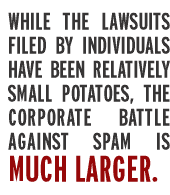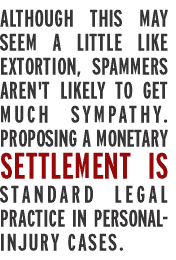| |||||||||

A profitable e-business idea: Go sue a spammer
 A favorable decision on June 6 by the Washington Supreme Court upholding that state's law against deceptive spam has energized people who practice a profitable form of e-business: suing spammers. A favorable decision on June 6 by the Washington Supreme Court upholding that state's law against deceptive spam has energized people who practice a profitable form of e-business: suing spammers. Martin Palmer, a citizen of Washington state, says he's collected more than $13,000 from spammers in 24 small-claims court actions, all of which he's won. Palmer, who said he often doesn't even have to go into court to win, initially requests that a spammer simply pay him $500 for violating the law or face a lawsuit. He says he's settled another 15 cases this way for $275 from each spammer. "I haven't got any more unsolicited e-mail from any of these people since," Palmer says. He's even streamlined the collection procedure by inviting the spammers to send him their money using PayPal. Meanwhile, Bruce Miller, the Webmaster of a site that advises interested parties on how to use Washington's anti-spam law, says he's collected $3,900 from four spammers without ever setting foot in a court. Merely requesting a $1,000 settlement in lieu of a lawsuit worked for him, he says. Although this may seem a little like extortion, spammers aren't likely to get much sympathy. Indeed, proposing a monetary settlement is standard legal practice in personal-injury cases. "As a result of doing this demand for damages," Miller says, "I've had the privilege of talking with corporate lawyers for some very major American corporations."
Washington's law is widely considered the strongest of the anti-spam laws that now exist in 18 U.S. states. The law doesn't prohibit all unsolicited commercial e-mail (UCE), commonly known as spam. Instead, it prohibits sending a Washington resident any commercial e-mail, solicited or unsolicited, that falsifies its return address or origin, or that uses a third party's domain name without permission. The unanimous decision of the court is seen by many as a turning point in efforts to prohibit spam. A spammer using a free Hotmail account to send UCE to a Washington resident, for example, would violate the state law because Hotmail didn't authorize the use of its domain name for spamming. In the court's decision, the justices found that the law doesn't restrict interstate commerce. E-mailers don't need to determine which addresses belong to Washington residents if a message is accurate about its origins, the court wrote. According to the decision, "the only burden the act places on spammers is the requirement of truthfulness, a requirement that does not burden commerce at all but actually facilitates it by eliminating fraud and deception." Spammers usually falsify the return address and origin of messages in an attempt to avoid detection. How, then, are outraged e-mail recipients able to identify spammers in order to sue them? The resource pages of organizations such as SueSpammers.org and the Coalition Against Unsolicited Commercial Email provide the answer. A spammer's true identity can often be pinpointed with accuracy. While the lawsuits filed by individuals have been relatively small potatoes, the corporate battle against spam is much larger. The European Union projects that as the Internet nears 400 million consumers worldwide, $8.5 billion (10 billion euros) a year will be spent paying connect-time charges to download spam. To eliminate the problem, strong opt-in only laws are now in place in Austria, Denmark, Finland, Italy and Germany. The EU's estimate, furthermore, doesn't include the price of Internet service providers' efforts to combat spam. America Online says spam represents 30 percent of all e-mail traffic. Several successful lawsuits filed in the late '90s by AOL, CompuServe and others to recover damages from spammers were favorably cited by the Washington court in its opinion. At last, the legal battle against spammers may have tipped in favor of the weary recipients.
Next week: Brian Livingston's Wired Watchdog column appears at CNET News.com every Friday. Do you know of a problem affecting consumers? Send info to tips@BrianLivingston.com. He'll send you a book of high-tech secrets free if you're the first to submit a tip he prints. on the soapbox |
|
|||||||||||||||||||||||
|
Send us news tips | Contact Us | Corrections | Privacy Policy |
|

